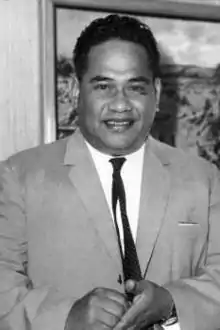Hammer DeRoburt
Hammer DeRoburt GCMG OBE (25 September 1922 – 15 July 1992) was the first President of the Republic of Nauru, and ruled the country for most of its first twenty years of independence.
Hammer DeRoburt | |
|---|---|
 Hammer DeRoburt, 1968 | |
| 1st President of Nauru | |
| In office 17 May 1968[1] – 22 December 1976 | |
| Deputy | Buraro Detudamo |
| Preceded by | Office Established |
| Succeeded by | Bernard Dowiyogo |
| In office 15 May 1978 – 17 September 1986 | |
| Deputy | Buraro Detudamo |
| Preceded by | Lagumot Harris |
| Succeeded by | Kennan Adeang |
| In office 1 October 1986 – 12 December 1986 | |
| Deputy | Buraro Detudamo |
| Preceded by | Kennan Adeang |
| Succeeded by | Kennan Adeang |
| In office 22 December 1986 – 17 August 1989 | |
| Deputy | Buraro Detudamo |
| Preceded by | Kennan Adeang |
| Succeeded by | Kenos Aroi |
| Chairman of the Council of State | |
| In office 31 January 1968 – 17 May 1968 | |
| Preceded by | Office Established |
| Succeeded by | Office Abolished |
| Member of the Nauruan Parliament for Boe | |
| In office 31 January 1968 – 15 July 1992 | |
| Preceded by | Constituency Established |
| Succeeded by | Michael Aroi |
| Personal details | |
| Born | 25 September 1922 Nauru |
| Died | 15 July 1992 (aged 69) Melbourne, Victoria, Australia |
| Spouse | Lukale Rowena Harris |
Background and early career
DeRoburt was born in Nauru on 25 September 1922. He was the son of DeRoburt and Eidumunang; his maternal grandfather Daimon was the island's head chief from 1920 to 1930.[2] He also had Banaban heritage, as his grandmother was from the island.[3] DeRoburt was a member of the Iruwa tribe.[4] He was raised in Boe District.[2] After being educated on Nauru, he attended the Gordon Institute of Technology in Geelong, Australia.[3] After returning to Nauru, he started working as a teacher.[3]
During the Japanese occupation of Nauru he was deported to Truk by the Japanese, along with most of the Nauruan population. When he returned to Nauru in 1946 he started working at the Department of Education.[3] He decided to stand in the first elections to the Local Government Council in 1951, and although he gained enough support to be nominated as a candidate in the Boe constituency, he was disqualified due to irregularities in his nomination.[5] Local residents and European residents protested without success, whilst a petition to the 1953 Visiting Mission from the United Nations was also overlooked.[5]
In 1955 elections he stood again in the Boe constituency and was elected to the Council.[3] In 1956, the Council elected him the last Head Chief of Nauru.[5]
Presidency of post-independence Nauru
.jpg.webp)
DeRoburt led the country to independence on 31 January 1968 and was president for most of the period until 17 August 1989. In December 1976, younger politicians gained a majority and installed Bernard Dowiyogo as president, but DeRoburt returned to power in May 1978. He was also out of office for two short periods in September and December 1986.
In his final term, DeRoburt's government filed a case against Australia in the International Court of Justice for not rehabilitating mined-out areas of the island. His last public appearance was in the ICJ hearing in November 1991.[6]
Personal
He was given an honorary knighthood by Queen Elizabeth II in 1982.
DeRoburt is credited with popularising Australian rules football to Nauru, which became the national sport.
He died in Melbourne in 1992[6] from diabetes mellitus. He was given a state funeral, and buried in Boe Cemetery.[7]
References
- "Nauru Government Gazette, No. 15 (20 May 1968)". paclii. Retrieved 29 September 2022.
- Pollock, Nancy (2020). "DeRoburt, Hammer (1922–1992)". Australian Dictionary of Biography.
- Nancy Viviani (1970) Nauru: Phosphate and Political Progress Australian National University Press, p. 107
- Cain, M. B. (25 November 1992). "BIRTHS, DEATHS AND MARRIAGES" (PDF). Republic of Nauru Government Gazette (81): 3.
- Viviani, p108
- Bain, Kenneth (22 July 1992). "Obituary: Hammer DeRoburt". The Independent. Retrieved 1 October 2022.
- Pollock, Nancy. "DeRoburt, Hammer (1922–1992)". Australian Dictionary of Biography. Retrieved 7 June 2023.